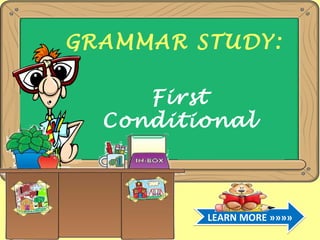First conditional-lesson
- 1. GRAMMAR STUDY: First Conditional LEARN MORE ┬╗┬╗┬╗┬╗
- 2. FORM: IF+ PRESENT SIMPLEŌĆ” FUTURE SIMPLE LEARN MORE ┬╗┬╗┬╗┬╗
- 3. Uses: To talk about situations which are likely to happen in the future and their probable results or consequences: Example: If we don┬┤t leave now, we will miss the train. LEARN MORE ┬╗┬╗┬╗┬╗
- 4. To Make: Predictions Example: If the weather is nice tomorrow, there will be a lot of people on the beach. LEARN MORE ┬╗┬╗┬╗┬╗
- 5. It is also used to Make: promises Example: If you pass the exam, I┬┤ll buy you a motor bike. LEARN MORE ┬╗┬╗┬╗┬╗
- 6. It is also used to Make: Threats Example: I┬┤ll tell the director if you don┬┤t behave yourself. LEARN MORE ┬╗┬╗┬╗┬╗
- 7. It is also used to Make: Warnings Example: If you don┬┤t take more care, You┬┤ll have an accident. LEARN MORE ┬╗┬╗┬╗┬╗
- 8. Note that: ’ā╝ The if clause can be put at the beginning of the sentence or after the main clause. ’ā╝ When the If Clause comes first, we separate it from the main clause with a comma. LEARN MORE ┬╗┬╗┬╗┬╗
- 9. Note that: ’ā╝ When the main clause comes first, there is no comma between it and the if clause. The Future Simple can be replaced in the man clause by a modal verb. LEARN MORE ┬╗┬╗┬╗┬╗
- 10. Thank you for your Š▒▓į│┘▒░∙▒▓§│┘╠²!










